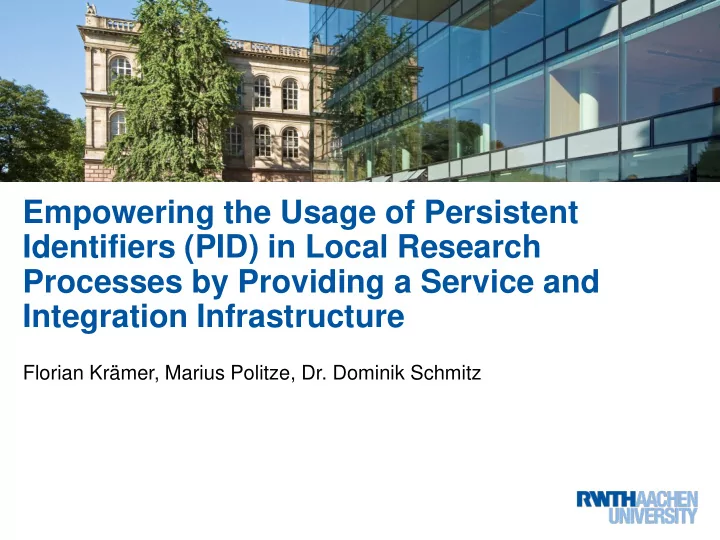

Empowering the Usage of Persistent Identifiers (PID) in Local Research Processes by Providing a Service and Integration Infrastructure Florian Krämer, Marius Politze, Dr. Dominik Schmitz
Content • A quick word about RWTH Aachen University and Research Data Management • Challenge: How to bring PIDs to researchers? • Our solution: flexible web services • PID concept • Pre-existing solutions: support for the core processes teaching, learning and research • The web services for PID usage • Managing rights to update PID information • Summary and Outlook Empowering the Usage of Persistent Identifiers (PIDs) | Florian Krämer | Marius Politze | Dr. Dominik Schmitz | 02.09.2016 | RDA Europe | Views on PID Systems | Workshop
RWTH Aachen University and Research Data Management • Project Group • IT Center • University Library and • Department Research and Career as central service providers • Central services • Backup/Archive, Storage • Publication Server • Support • Training Empowering the Usage of Persistent Identifiers (PIDs) | Florian Krämer | Marius Politze | Dr. Dominik Schmitz | 02.09.2016 | RDA Europe | Views on PID Systems | Workshop
RWTH Aachen University ~5,000 Internationals ~10,000 enrollments ~44,000 Students from 117 Countries in winter term 2015/16 ~8,000 Employees 9 Faculties ~540 Professors 152 Courses of study 260 Institutes Empowering the Usage of Persistent Identifiers (PIDs) | Florian Krämer | Marius Politze | Dr. Dominik Schmitz | 02.09.2016 | RDA Europe | Views on PID Systems | Workshop
Challenge: How to bring PIDs to researchers? IT environments & researchers’ workflows • The IT environments differ significantly • Historically grown local infrastructures • Diverse methods and machinery require specific IT solutions • More than one solution for the same problem • PIDs need to be easy to use • Providing an easy to use web interface • Integration in their existing environment • Researchers need to be aware of the existence of a PID system Empowering the Usage of Persistent Identifiers (PIDs) | Florian Krämer | Marius Politze | Dr. Dominik Schmitz | 02.09.2016 | RDA Europe | Views on PID Systems | Workshop
Our solution: flexible web services PID concept • Early adoption: • PIDs should be registered as soon as data is produced • Even if it is not clear yet whether the data has any value • Flexible usage to make data findable internally or also externally • Minimal information stored with PID • URL • DATAURL • METAURL • RELATED ID • PIDs to link information from and to different systems providing more (context) information on the data • Using the Handle system, specifically ePIC • Simple registration process compared to DOI • Single PID prefix for the whole university • Who is authorized to register or update a PID? Empowering the Usage of Persistent Identifiers (PIDs) | Florian Krämer | Marius Politze | Dr. Dominik Schmitz | 02.09.2016 | RDA Europe | Views on PID Systems | Workshop
Our solution: flexible web services Pre-existing solutions: support for the core processes teaching, learning and research • Connect legacy systems with a consistent API • An SOA that resembles university processes • Started with E-Learning • Generalize and try to apply to other fields: Campus Management, Identity Management Research Data Management / E-Science • Security by design • Confidentiality • Integrity • Availability • Protect personal and confidential data Empowering the Usage of Persistent Identifiers (PIDs) | Florian Krämer | Marius Politze | Dr. Dominik Schmitz | 02.09.2016 | RDA Europe | Views on PID Systems | Workshop
Our solution: flexible web services The web services for PID usage • Create PIDs • Using OAuth2 for authorization • Assigned to the person and institute • Create Formalized Metadata (RDF) • Based on Metadata schemas • Can be stored locally or in a centralized DB • Display PID information and Metadata • Landing page for data • Contact information to acquire access • Limit possible operations • Only a single PID generator • No delete operation Empowering the Usage of Persistent Identifiers (PIDs) | Florian Krämer | Marius Politze | Dr. Dominik Schmitz | 02.09.2016 | RDA Europe | Views on PID Systems | Workshop
Our solution: flexible web services The web services for PID usage Empowering the Usage of Persistent Identifiers (PIDs) | Florian Krämer | Marius Politze | Dr. Dominik Schmitz | 02.09.2016 | RDA Europe | Views on PID Systems | Workshop
Our solution: flexible web services Managing rights to update PID information • Responsibilities are often shared • Multiple employees (e.g. admin and researcher) • Several organizations (e.g. Institute and Library) • Lightweight way of passing permissions • One Time Access Tokens (OTA) • Passed between systems using the REST API • Direct access to PID server for “trusted systems” • OTAs are self-contained • signed JSOn Web Tokens with a shared secret • Currently used to connect • Metadata Management • Archive • Publication Server Empowering the Usage of Persistent Identifiers (PIDs) | Florian Krämer | Marius Politze | Dr. Dominik Schmitz | 02.09.2016 | RDA Europe | Views on PID Systems | Workshop
Summary and Outlook • Diverse IT environments • Simple PID concept • Goal: integration of PID service in local IT solutions • Usage of web service • Decentralized rights management • Connect additional (decentralized) systems • Enable metadata harvesting by a central registry • Enable metadata based search and retrieval while respecting the access rights Empowering the Usage of Persistent Identifiers (PIDs) | Florian Krämer | Marius Politze | Dr. Dominik Schmitz | 02.09.2016 | RDA Europe | Views on PID Systems | Workshop
Recommend
More recommend